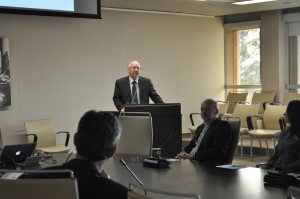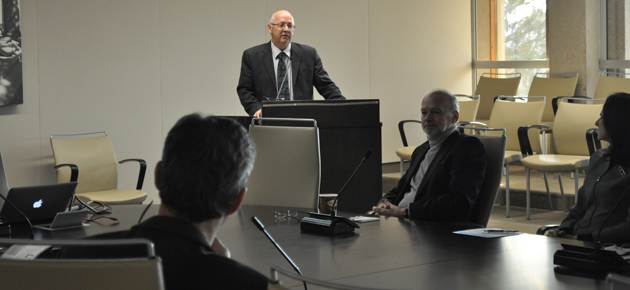
Bill Gough, vice-dean and professor, explained UTM’s new role at the Governing Council. AYMAN KHAN/THE MEDIUM
U of T’s governing structure is undergoing changes to allow for more autonomous decision-making at UTM and UTSC. In search of feedback from the UTM community, a town hall focussed on faculty, staff, and administration was held on Friday in the Council Chambers.
Bill Gough, the vice-dean of graduate education and program development, sits on the “Task Force on Governance”. He provided background information on the committee’s recommendations and the implementation of the new structure.
With the creation of Towards 2030 in 2007, the document that outlines the changes the university will undergo over the next 20 years to achieve higher standards of excellence, the TFOG was stricken to oversee the restructuring of the university’s decision-making processes.
In particular, the TFOG recommended that the responsibilities of the various boards under the Governing Council, the highest decision-making body at the university, be reassigned.
In addition to the Business Board, the Academic Board, and the University Affairs Board, UTM and UTSC will have their own Campus Councils with separate committees to review academic and campus affairs. This will allow for planning that is better tailored to the local community.
There are financial thresholds involved in the autonomy of the satellite campuses. Expensive projects and new academic programs will be routed away from the Campus Council to the respective board under the Governing Council.
The changes are meant to allow UTM and UTSC to develop as individual campuses while maintaining a consistent U of T identity and standard.
“[UTM and UTSC] started with a college model, similar to that of St. George, and they’ve really turned into campuses—campuses that have infrastructure, residences, childcare, their own police system, and a student body that identifies themselves in a very different way,” Gough said.
“We are a campus, and we have concerns that go beyond the academic nature of our operation which we share with all the other faculties, but we also have a site. The development of the site is important. We need the infrastructure to best serve our students.”
Currently, the Erindale College Council at UTM can make recommendations on matters concerning academics and planning, but lacks an authoritative decision-making body. The Campus Councils will provide a forum for UTM and UTSC under the Governing Council to decide local matters.
Peter Macdonald, a professor and the chair of the Department of Chemical and Physical Sciences, steered the discussion toward the concept of divisional representation on the Governing Council. Even though UTM and UTSC will have their own councils, all decisions will ultimately need to be approved by the Governing Council.
Of the 12 faculty positions, only two are allotted to UTM and UTSC. Of the four student positions, there is no requirement that any member be from the satellite campuses. There are four other student positions divided between graduate and part-time.
After a vigorous campaign last year, fourth-year UTM student Aly-Khan Madhavji was elected to the Governing Council. In past years, student positions have been dominated by St. George students, leaving UTM and UTSC undergraduates without representation.
Gough explained that although the issue has been acknowledged, there are no plans to redistribute representation among the three campuses. With seven colleges at St. George, it would be difficult to allot even half of the student representation to the satellite campuses.
“If we don’t warrant a full position within the four now, we should with future growth. It’s something that hasn’t been addressed at all. Getting a student representative on [the] Governing Council from UTM is important,” said Lee Bailey, a professor and the chair of the Resource Planning and Priorities Committee.
The Mississauga location was originally created as Erindale College, a branch of the downtown campus. In 2003, UTM became a standalone faculty and a distinct undergraduate division, separate from the Faculty of Arts and Science of the downtown campus. Since then, UTM’s undergraduate enrolment has doubled to over 11,000 students.
A second town hall for students will be held this Wednesday at 11 a.m. in the Council Chambers (DV 3130).

